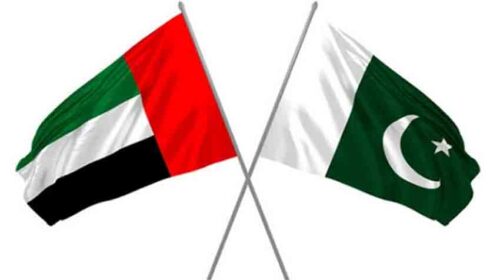In a major development, Pakistan and the UAE have decided to enter into a GtG long-term agreement for the import of petrol, jet fuel and crude oil to ensure sustainable availability of petroleum products in the country and both countries would soon sign an IGA (Inter-governmental agreement).https://googleads.g.doubleclick.net/pagead/ads?client=ca-pub-7369466212570555&output=html&h=280&slotname=6796042982&adk=1203330148&adf=1013936880&pi=t.ma~as.6796042982&w=700&fwrn=4&fwrnh=100&lmt=1667672427&rafmt=1&format=700×280&url=https%3A%2F%2Fe.thenews.com.pk%2Fdetail%3Fid%3D144758&fwr=0&fwrattr=true&rpe=1&resp_fmts=3&wgl=1&uach=WyJXaW5kb3dzIiwiMTAuMC4wIiwieDg2IiwiIiwiMTA3LjAuNTMwNC44OCIsW10sZmFsc2UsbnVsbCwiNjQiLFtbIkdvb2dsZSBDaHJvbWUiLCIxMDcuMC41MzA0Ljg4Il0sWyJDaHJvbWl1bSIsIjEwNy4wLjUzMDQuODgiXSxbIk5vdD1BP0JyYW5kIiwiMjQuMC4wLjAiXV0sZmFsc2Vd&dt=1667672427241&bpp=3&bdt=581&idt=77&shv=r20221101&mjsv=m202211010101&ptt=9&saldr=aa&abxe=1&cookie=ID%3Ddce5cfc23e563877-22c5defc93d60074%3AT%3D1661970748%3ART%3D1667671621%3AS%3DALNI_MZXkh07nnjrl2180C5QcBwf3g9deQ&gpic=UID%3D00000aac0be7592c%3AT%3D1661970748%3ART%3D1667671621%3AS%3DALNI_MZG0NNTS78RtPPluG6dAJqMpr0OMA&prev_fmts=0x0&nras=1&correlator=2634427464875&frm=20&pv=1&ga_vid=1599331109.1666292316&ga_sid=1667672427&ga_hid=1402267512&ga_fc=1&u_tz=-420&u_his=1&u_h=768&u_w=1366&u_ah=728&u_aw=1366&u_cd=24&u_sd=1&dmc=4&adx=325&ady=418&biw=1349&bih=600&scr_x=0&scr_y=0&eid=44759876%2C44759927%2C44759837%2C42531706%2C44777508%2C31070696%2C44770881%2C44775017%2C21066430%2C31060048&oid=2&pvsid=2580789940348446&tmod=1139768366&uas=0&nvt=1&eae=0&fc=1920&brdim=0%2C0%2C0%2C0%2C1366%2C0%2C1366%2C728%2C1366%2C600&vis=1&rsz=o%7C%7CeE%7C&abl=CS&pfx=0&fu=128&bc=31&ifi=2&uci=a!2&fsb=1&xpc=TKWVkdG4K2&p=https%3A//e.thenews.com.pk&dtd=86
Pakistan would import 1.5 million tons of Motor Spirit (Mogas) i.e. 30 cargoes in one year under a 5-year deal, which means that PSO would import two and a half to three cargoes a month.
To this effect, on behalf of Pakistan, the public state-owned company, Pakistan State Oil (PSO) and on behalf of the UAE, ADNOC (Abu Dhabi National Oil Company) will sign a business pact on a GtG basis, and the import of petrol from the UAE’s ADNOC is most likely to begin from January 2023 under the GtG deal.
“This has been decided in recent talks held in Abu Dhabi wherein Pakistan’s delegation was headed by Musadik Masood Malik, Minister of State, comprising the secretary of petroleum, secretary of the Board of Investment, MD PSO, MD PARCO and other officials of the Petroleum Division,” a senior official who was also a part of the talks told The News.
“We are sending PSO’s commercial team to the UAE on November 8-9 for precise talks on the structure of the commercial agreement and finalise the specifications of petrol, jet fuel and crude oil for the country’s existing refineries.”
PSO gets diesel from KPC (Kuwait Petroleum Company) under the GtG deal and purchases petrol from the open market with high premiums depending upon the prices of products in the international market. Now under the GtG deal, PSO would get petrol from ADNOC at a negotiated price. In addition, PSO would also import jet fuel on a need basis as the country’s refineries most of the time cater for the jet fuel needs. The refineries such as PARCO would also import crude oil from ADNOC under the GtG deal.
“The GtG deal with the UAE would provide financial ease to the country,” the official said, adding that the import of petroleum products would be ensured from January 2023, particularly petrol.
The Pakistan side also raised the issue of purchasing LNG on GtG deal, but the UAE authorities refused over non-availability of LNG and over-commitment with Europe, and said they may be in a position after 2025 to ink a deal with Pakistan.
As far as the installation of the state-of-the-art deep conversion refinery is concerned, the official said that Pakistan’s delegation also held talks with the delegation of the Kingdom of Saudi Arabia in Abu Dhabi. Both sides discussed the structure of the refinery to be set up in Pakistan. Saudi Arabia would be the major stakeholder in the refinery to be set up either in Karachi or Hub (Balochistan). China, the UAE and the country’s companies such as OGDCL, PPL, PSO and PARCO can be a part of the refinery.
PARCO, PSO and relevant officials would stay in contact with counterparts of Saudi Aramco for finalising the modalities of the mega refinery and both sides are mandated to fine-tune the agreement till the visit of Saudi Crown Prince Mohammad Bin Salman, which is likely in the current month.
Prime Minister Shehbaz Sharif earlier visited Saudi Arabia on October 24 where he took up the restoration of MoUs worth $21 billion, including the project of a refinery and petrochemical complex of $10 billion signed in February 2019.
However, under the new scenario, the petrochemical complex is no more part of the project. Now the refinery will be set up with the capacity to refine 350,000 to 400,000 barrels of crude oil per day.







